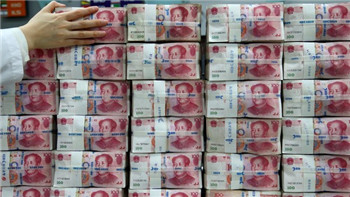(单词翻译:单击)

A high-stakes battle between China’s central bank and speculators taking aim at the renminbi escalated last week with US hedge fund manager Kyle Bass’s starkly worded letter to investors predicting a Chinese debt and currency crisis.
中国央行与意图狙击人民币的投机者展开的干系重大的战斗在上周进一步升级,原因是美国对冲基金经理凯尔巴斯(Kyle Bass)向投资者发出了一封措辞尖锐的信,预言中国将遭遇债务和货币危机。
Zhou Xiaochuan, People’s Bank of China governor, broke months of silence at the weekend with comments playing down the decline of China’s foreign exchange reserves to a more than three-year low and stressing that Beijing was not seeking to devalue its currency. This came a few weeks after state media warned George Soros against “declaring war” on the renminbi.
而就在上周末,中国央行行长周小川打破了数月来的沉默,发表言论淡化中国外汇储备规模降至逾三年低点的影响,并强调中国无意让人民币贬值。几周前,中国官方媒体还警告乔治∠坽斯(George Soros),对人民币“宣战”要小心后果。
The war of words is likely to have real-world consequences: Chinese authorities are well aware that perception often equals reality in financial markets, as bearish sentiment becomes self-fulfilling when investors flee en masse.
这场口水战可能会产生现实影响:中国当局很清楚,在金融市场中,看法往往会变成现实,因为投资者一旦大规模逃离,看空情绪就会进入自我应验的状态。
Mr Bass’s letter found a receptive audience because it played into two popular themes: alarm at capital flight and scepticism over Chinese statistics, which many people presume to be fabricated.
巴斯信中的观点很容易被人接受,原因是它迎合了两个流行主题:对资本外逃的担忧和对中国统计数字的怀疑——许多人认为中国的数据是编造的。
There is just one problem: one of Mr Bass’s key claims about China’s foreign exchange reserves data — and thus the central bank’s ability to defend the exchange rate against further depreciation — does not hold up to scrutiny.
只有一个问题:巴斯关于中国外汇储备数据——也就是中国央行防止人民币进一步贬值的能力——的一个重要论点经不住推敲。
At $3.2tn, China’s stated forex reserves remain the world’s largest. Economists broadly agree China requires about $2tn to meet the International Monetary Fund’s standard for reserve adequacy, based on what a country needs to pay for imports and meet foreign debt obligations.
中国公开宣称的3.2万亿美元外汇储备规模依然是全球最大的。经济学家普遍认为,中国需要大约2万亿美元,才能满足国际货币基金组织(IMF)有关外汇储备充足率的标准。这一标准是根据一国用来支付进口和偿付外债所需的外汇储备计算的。
But Mr Bass says China’s true reserves are more than $1tn below the headline total once necessary “adjustments” to official data are made. With less forex ammunition on hand than widely believed, the argument goes, the People’s Bank of China will be forced to scale back its defence of the currency.
然而,巴斯却表示,一旦对官方数据进行必要的“调整”,中国实际的外汇储备比对外公布的数字至少低1万亿美元。因此他认为,由于手头的外汇弹药少于人们普遍认为的数目,中国央行将不得不降低对人民币汇率的保卫力度。
Hayman has wagered billions that the renminbi and other Asian currencies will depreciate, joining hedge funds such as David Einhorn’s Greenlight Capital and London-based Omni Partners.
海曼资本(Hayman Capital)已斥资数十亿美元押注人民币和其他亚洲货币将会贬值,与其他一些对冲基金站到了一条线上,如戴维縠因霍恩(David Einhorn)的绿光资本(Greenlight Capital)以及总部在伦敦的Omni Partners。
The biggest “adjustment” Mr Bass makes is $700bn in reserves he says is tied up in the sovereign wealth fund, China Investment Corp. Launched in 2007, CIC’s mission was to raise returns on China’s foreign wealth, which was invested in US Treasuries and other low-yielding assets. By definition these assets are less liquid and not intended to be deployed in currency markets.
巴斯所做的最大一项“调整”,是他认为掌握在主权财富基金中投公司(China Investment Corp)手中的7000亿美元外汇储备。中投公司成立于2007年,任务是提高中国外汇财富的回报,这些外汇财富被投资于美国国债和其他低收益资产。按照定义,这些资产的流动性较差,中国无意将它们配置到外汇市场。
However, China economists say CIC’s assets are not included in the main forex reserves data that investors watch closely. When CIC was set up in 2007, China’s Ministry of Finance issued special bonds to the PBoC in exchange for a tranche of $200bn in foreign-exchange assets. The bonds filled the hole in the PBoC’s balance sheet that would have resulted from a simple transfer of assets. As domestic renminbi bonds, they are not classified among China’s forex reserves.
然而,中国的经济学家表示,中投公司的资产并没有被包括在投资者密切关注的主要外汇储备数据中。2007年中投公司成立时,中国财政部向中国央行发行了特殊债券,换取了2000亿美元外汇资产。若是简单的资产转移,就会在央行的资产负债表上留下一个空洞,而这些债券就填补了这个空洞。因为是国内人民币债券,这些债券不会被划归在外汇储备之中。
“This is pretty clear based on public disclosure and information,” said Tao Wang, China economist at UBS — although she acknowledged that “nothing is 100 per cent”.
“根据公开披露和相关信息,这件事相当清楚,”瑞银(UBS)中国经济学家汪涛表示,但她也承认“没有什么是百分之百确定的”。
Eswar Prasad, former head of the IMF’s China division, agrees that CIC assets are not counted.
IMF中国部前负责人埃斯瓦尔渠拉萨德(Eswar Prasad)认同中投公司的资产未被计入外汇储备的观点。
“If FX reserves were being used directly [in CIC], it’s not clear why MoF would have to issue bonds,” he said.
“如果外汇储备被直接使用(投入中投公司),就不清楚财政部为什么要发行债券了,”他说。
Classifying CIC assets as official reserves would also amount to a clear violation of IMF rules, which China agreed last year, for how reserves must be defined and reported. The IMF says only funds that are “readily available to the monetary authorities” may be counted as reserves. As a subsidiary of the finance ministry, CIC fails that test.
将中投公司的资产划归为官方储备也会明显违反IMF的规则。去年中国已同意了IMF有关外汇储备定义和报告的规则。IMF表示,只有“货币当局可轻易获得”的资金才能被计入储备。作为财政部下属的一家机构,中投公司不符合这一标准。
“If the assets are not on the PBoC’s balance sheet, then in principle FX holdings cannot be counted as part of reserves,” said Mr Prasad.
“如果这些资产不在中国央行资产负债表上,那么原则上,这些所持的外汇不可以计为储备的一部分,”普拉萨德表示。
Jianguang Shen, chief economist at Mizuho Securities Asia, says he has verified with the State Administration of Foreign Exchange, a unit of China’s central bank, that CIC assets are not included in their reserves. Safe did not respond to request for comment.
瑞穗证券(Mizuho Securities)亚洲首席经济学家沈建光表示,他已向中国央行下属的国家外汇管理局查证过,中投公司的资产不计入外管局的外汇储备中。外管局没有回应记者的置评请求。
“I think [Mr Bass’s] report is mistaken,” said Mr Shen, who previously worked at the IMF and European Central Bank.
“我认为(巴斯的)报告弄错了,”此前曾在IMF和欧洲央行(ECB)工作过的沈建光表示。
Mr Shen also notes that in 2007, Safe was happy to relinquish forex assets, as “twin surpluses” on both the current and financial accounts were flooding the central bank with more foreign assets than they could effectively manage. The US and Europe were also criticising China for fuelling global financial imbalances.
沈建光还指出,2007年时,外管局很乐意拿出外汇资产,因为经常账户和金融账户的“双顺差”使大量外汇资产涌入了央行,超出了央行能够有效管理的规模。另外,当时美国和欧洲也批评中国为全球金融不平衡推波助澜。
“At that time, Chinese authorities were actually embarrassed that reserves were rising all the time. They took a lot of blame for having too much reserves,” said Mr Shen.
“当时,中国当局对储备一直增加其实备感尴尬。他们为拥有太多储备承受了很多责难,”沈建光说。
Transfers of forex wealth from the PBoC to CIC after 2007 were not publicly disclosed but were probably handled similarly and in any case never matched the size of the initial tranche. Ms Wang estimates them at less than $100bn.
2007年以后,中国央行又几度将外汇财富转移给中投公司,没有公开披露,但很可能也是通过类似操作完成的,但无论如何,这些转移在数额上也无法与最初的那次相提并论。汪涛估计这些转移的总规模不到1000亿美元。
Mr Bass does not explain his $700bn figure but he may be extrapolating large undisclosed transfers based on the rapid growth of CIC’s total assets. Yet Ms Wang notes that such an estimate probably fails to account for the large capital appreciation of CIC’s portfolio, notably from its shares in state-owned banks, which have seen their market capitalisation grow enormously since 2007.
巴斯没有对他所说的7000亿美元数据做出详细解释,但他可能是根据中投公司总资产的快速增长,推断出发生过大额非公开转移的。然而,汪涛指出,这种估测很可能没把中投公司资产组合的大幅资本增值计算在内,尤其是中投公司所持有的国有银行股,这些股票自2007年以后市值大幅增长。
Hayman Capital did not respond to a request for comment.
海曼资本没有回应置评请求。
“The idea that the People’s Bank (of China) is running out of FX reserves doesn’t stand up to scrutiny,” Mark Williams, China economist at Capital Economics, wrote in a note on Monday. “But the fact that many take it seriously is a sign of how far sentiment has swung against China.”
“中国央行正逐渐耗尽外汇储备的观点经不起仔细推敲,”凯投宏观(Capital Economics)中国经济学家马克威廉姆斯(Mark Williams)周一在一份报告中写道,“但是,许多人都当真了,这表明看淡中国的情绪已变得多么强烈。”


